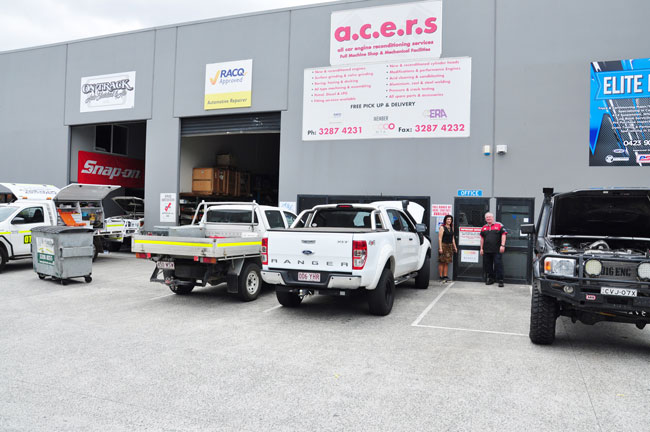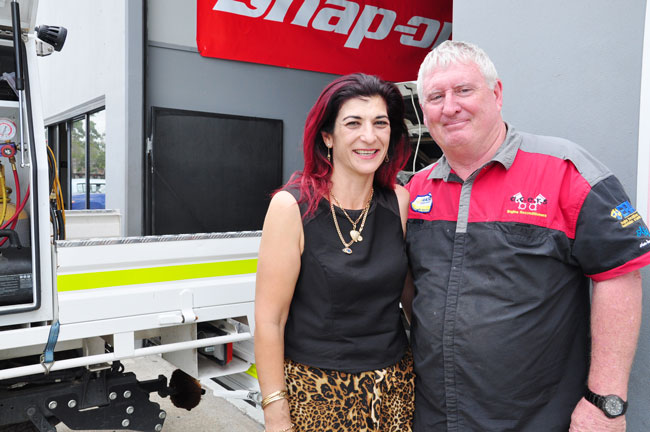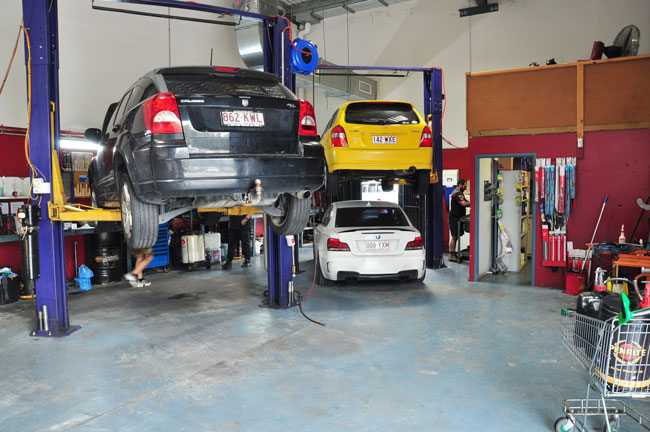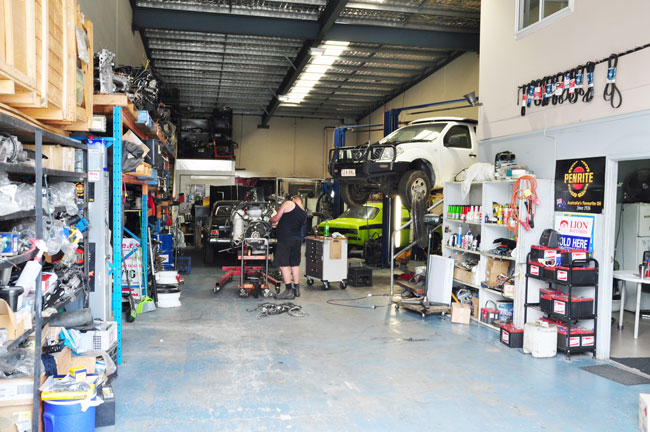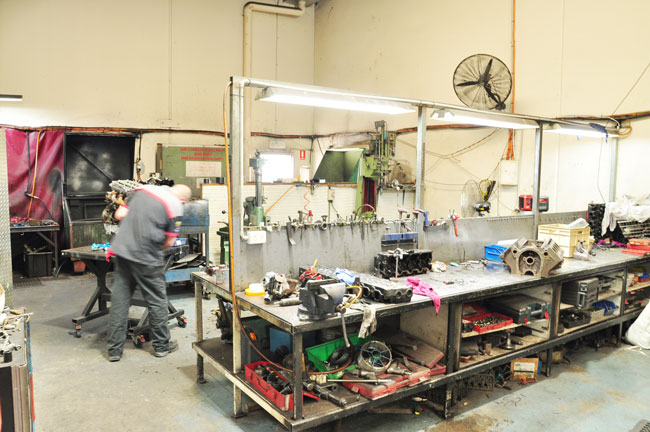MTA Q&A with All Car Engine Reconditioning Service (ACERS), Ormeau
A decision to take part of their business from home to a workshop created a thriving operation for Hatice and Len Hutchinson from All Car Engine Reconditioning Service (ACERS) at Ormeau. But for the couple, who share the role of secretary for the MTA Queensland ERAQ division on an annual basis, establishing the business hasn’t been without its dramas, as they explain . . .
WORDS and PICTURES: Lindsay Saunders
LS: When was ACERS established?
HH: 12 years ago. We are both licensed motor dealers, so we were buying and selling cars from home in Ormeau. We were also running an exporting business, supplying gold mines in the Solomon Islands with a range of needs, from vehicles and car parts right down to toiletries and a lot in between. It got to the point that doing it from home was too much, so we decided to open an engine reconditioning shop.
LH: We met at a warranty company where Tish was the secretary. I’ve always been involved in the motor industry and the trucking industry, and been working in this area for 40 years, and we decided to start our own company. About 12 months after that we got involved in the export business for the mines and half our week was doing that and the other half buying and selling cars.
LS: What are the businesses?
HH: We have the reconditioning engines business and then a more general mechanical business doing logbook services, mechanical repairs, dyno tuning, and preparing cars for motorsport – we worked on Steven Johnson’s Mustang for the Touring Car Masters last year. We’re truly a one-stop shop.
The main impetus for us to open the business was so Len could have a hoist to work with! He is a qualified mechanic and as part of our car business at home he would do roadworthy certificates, service and detail vehicles.
LS: How did it become such a success?
HH: We knew the contract with the gold mine was going to end so we were looking for something to fill that gap. Our idea was to keep doing what we were doing, buying and selling cars, from one shed with a hoist, and we opened a machine shop with a manager and a machinist while we kept doing that.
LH: With that business we weren’t dealing with the public but were doing the reconditioning work for another business. But over that first 12 months we discovered things weren’t running correctly and it cost us a lot of money.
Basically, we had to start again. We sat down and looked at what we had to do to stay afloat and realised we needed to open to the public. Incredibly, from the day we did that, we had work and we now send engines Australia-wide. We’ve had customers drive their cars to us from outside southeast Queensland and then fly home while their engines are worked on.
LS: What do you put that down to?
LH: I honestly don’t know. There must have been an element of word-of-mouth and Tish is an incredible people person and truly knows her stuff. When we opened the doors we had work, although it took us four or five years to get back on our feet.
Tish’s personality has played a big part in that success. When she gets her teeth into something, she learns everything. People tell me, ‘she shouldn’t know all she knows’ about every aspect of our work – engines, cars and so on. She does diagnostics better than me and her gut feeling is right nine times out of 10. She’s brilliant.
Whatever she does she does very, very well, and she’s put this place where it is today.
LS: What’s your approach to the business?
LH: I learnt from being in the warranty company and seeing repairers who didn’t do their best work or didn’t deal with customers correctly, especially female customers. It would astound me, and I’ve always said if we have to work like that to make a dollar, we’ll close the doors.
HH: We like to do the right thing. For example, the other week we had a customer we knew was doing it tough so when I took her car back, I filled it with fuel. Then I noticed how bad her tyres were, so we put new tyres on. When you see someone struggling you need to do the right thing.
LS: Why is it important to be members of the MTA Queensland?
LH: It’s credibility to start with. It shows our customers and our industry partners we are legitimate and a serious part of the industry. To be able to say you are a part of it demonstrates integrity.
LS: You are both on the board of MTAQ’s Engine Reconditioners Association committee (ERAQ). Why did you decide to take that on?
LH: We were asked, and Tish has some great ideas to put forward. You need to be involved in the industry you work in and bring energy and ideas to the table. You can’t leave it up to someone else all the time.
LS: How is the industry changing?
LH: There isn’t the interest in the engineering side of mechanical work as there used to be. The new era is more about ‘if we can take it off the shelf and use it, we will’. Plug ‘n’ play. It’s what the Americans were doing 25-30 years ago and we all made jokes about it then. We Aussies and Kiwis had to make do with what we had. Now we’ve caught up to the Americans, so many mechanic businesses now are just ‘parts replacers’ and it isn’t doing our industry any favours.
However, our apprentices do everything. I send them to a transmission place for a week, for example, and to an auto electrician. You need to be able to pull things apart and put them together again.
HH: We like to know why something has failed rather than just say ‘it’s broken’. We like to explain why it’s happened.
LS: Is there an answer?
LH: Money can be part of it. You must pay your people right and my idea is to pay to get the quality. You get what you pay for. I see it all the time in other businesses – they don’t get paid right and you see it in the work. We also have to compete with the kind of money being offered in the mining industry.
LS: Where does most of your work come from?
HH: A lot of our work is fleet work. We look after the needs of a lot of businesses, some with fleets of 100 or so vehicles. And we save them money. For instance, if an alternator has failed, we don’t just get a new one. If it is appropriate, we get it reconditioned and can save our client 50 per cent.
LH: At the same time, we can find out why the alternator failed and see if there’s a bigger issue with the vehicle.
HH: It’s going back to old-fashioned mechanic work. We advocate for our customers and I particularly advocate for female customers. We do hear some real horror stories from our customers, and it makes my blood boil.
LS: Even today gender is an issue in the industry?
LH: Female customers prefer to deal with Tish, which is fair enough considering how many bad experiences we hear about. Likewise, we have had male customers who initially don’t want to talk to her about problems. Then she sorts things out and they realise their bias.
HH: I think females often take more time dealing with customers. You must have patience. So often by the time a customer comes to us, especially with the engine shop, they’ve been stuffed around. So, you must really listen.
And it’s important to have the answers for clients for a quote straight away. We strive to give customers a ballpark figure so they know where they are right from the start. It also gives them confidence in us, that we know what we’re doing and what we’re talking about.
LH: And we always keep customers informed right through the process.
HH: That’s right. It’s why we take photos of every job as we do it.
LH: And we also don’t ‘upsell’ like some places. We tell our customers what’s wrong with their vehicle and that’s it.
LS: Will the increasing number of electric and hybrid vehicles affect your business?
HH: It’s something everyone in the industry needs to look at and take seriously but, as a customer said to me, they seem to be building lots of massive service stations around the place but we’re not seeing charge points springing up. There’s a lot of infrastructure still to be created for electric vehicles.
Then there’s the price. For the moment, most people just can’t afford them.
LH: The pace of change and the need to be on top of it, especially for businesses such as ours that look after virtually any kind of vehicle, is vital.
HH: There also needs to be greater sharing of information, especially from the dealers. We strike it all the time when we contact them about a problem.
They’ll tell us nothing, say they don’t know anything about it, yet we’ve seen online that it’s a known problem overseas and domestically in Australia.
LH: In the US there’s full data sharing and it’s the law. We should have the same situation here. My belief is that as a consumer, you own that car so you, and the people you authorise to fix it are entitled to that information.
Source: Motor Trader E-Magazine (Nov) 2019
6 Nov 2019




